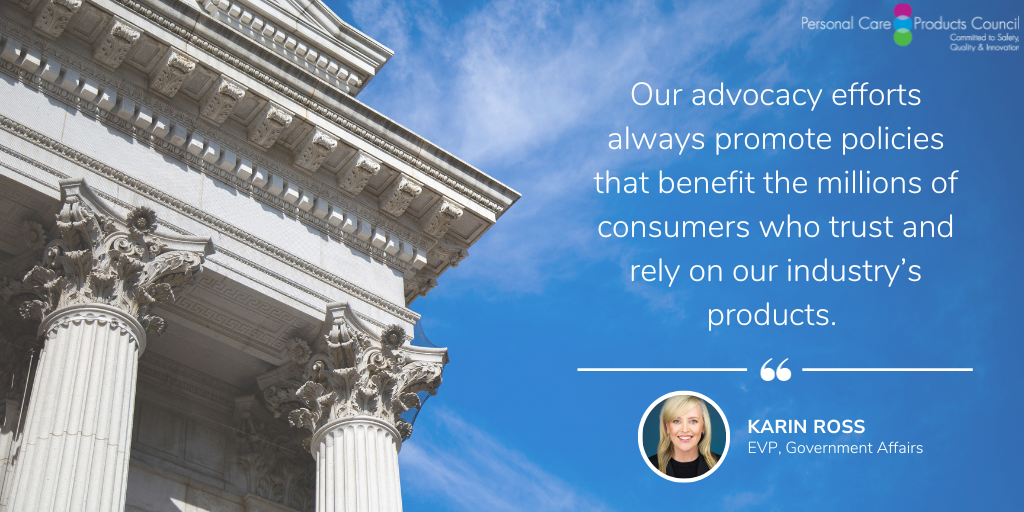Advocating for the Future
Karin Ross
EVP, Government Affairs
PCPC
For more than a decade, the Personal Care Products Council (PCPC) and our member companies worked diligently with a bipartisan group of congressional leaders and a diverse group of stakeholders to modernize and enhance the effectiveness of the U.S. Food and Drug Administration’s (FDA) regulatory authority over our sector and to provide the safety reassurances that consumers expect and deserve.
We are thrilled that the long-awaited and bipartisan Modernization of Cosmetics Regulation Act (MoCRA) was passed and enacted this past December. This historic legislation modernized FDA oversight of cosmetics and personal care products, giving the FDA significant new authorities and regulatory tools that promote product safety and innovation for our science-driven industry and reinforcing consumer confidence.
But there is more work to be done. The FDA needs funding to fully implement these critical provisions. The message from member companies, PCPC and the Professional Beauty Association to Capitol Hill this month was clear and urgent: we support the $7 million in the Senate Agriculture, Rural Development, Food and Drug Administration, and Related Agencies Appropriations Act to empower the FDA to fully implement MoCRA. Representatives met with members of Congress, including chairs, vice chairs and members of the House and Senate Appropriations Committees, to urge Congress to help the FDA realize the full potential of MoCRA and its public health mission. A lack of funding now would undermine more than a decade of bipartisan effort.
These Lobby Days give us an opportunity to have meaningful conversations with Congress that highlight the work our members do every day to promote the safety and well-being of their employees, consumers and communities. Our member companies are proud of the work they do to advance industry efforts, and we welcome the opportunity to share our priorities for the future with policymakers. Beyond the funding of MoCRA implementation, we encouraged members of Congress to continue to eliminate trade barriers for cosmetics and personal care products sold worldwide and to support critical legislation on a number of issues:
- Humane Cosmetics Act – We applaud S. House of Representatives by Reps. Don Beyer (D-Va.), Vern Buchanan (R-Fla.), Ken Calvert (R-Calif.) and Tony Cárdenas (D-Calif.) for the reintroduction of this legislation, which would prohibit animal testing of cosmetics and their ingredients and prohibit the sale in the United States of cosmetics that have been tested on animals.
- 45B Tip Tax Credit – This legislation would extend the credit to beauty service establishments and their employees. An existing tip tax credit is currently only available to restaurants.
- CROWN Act – This bill prevents workplace discrimination based on characteristics such as hair texture and styles.
- SHOP SAFE Act – This bill prevents the sale of counterfeit products.
To top it all off, we celebrated the launch of the Congressional Cosmetics Caucus, a bipartisan forum chaired by Reps. Linda Sanchez and Nicole Malliotakis, to build awareness and dialogue on the cosmetics and personal care industry’s important issues.
Our advocacy efforts always promote policies that benefit the millions of consumers who trust and rely on our industry’s products. Last year marked a major milestone with MoCRA’s passage, and we look forward to working with policymakers and NGO partners to build on that effort in the 118th Congress and beyond.

